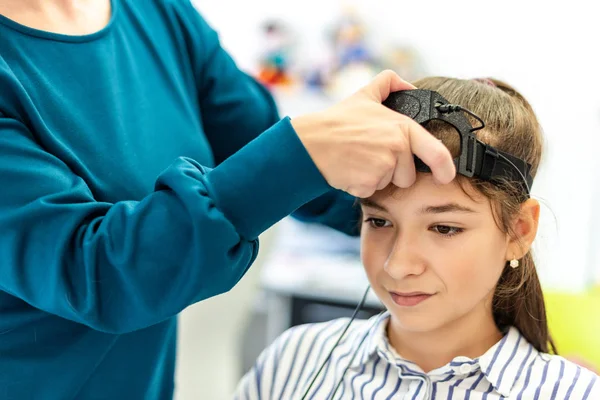Introduction
Neuropathy leads to nerve damage. As a result, patients with neuropathy have persistent pain, work disability, and even difficulty in movement. The rates of depression and anxiety are higher in a patient with neuropathy because it affects social functioning. The higher the intensity of pain and disability, the more likely are the chances of mental health being affected.
Our Wellness Programs
Treatment of Peripheral Neuropathy for Better Mental Health
Peripheral neuropathy leads to nerve damage in the arms and legs, which causes pain and irritation or immobility. These lead to depression and anxiety in patients, affecting their mental health. Proper and timely treatment of peripheral neuropathy through medicines, Neurotherapy, and occupational therapy is important to reverse and manage its symptoms.
Looking for services related to this subject? Get in touch with these experts today!!
Experts

Mansi Chawla

India
Psychologist
Experience: 12 years

Sapna Zarwal

India
Psychologist
Experience: 19 years

Davis Emerson

India
Psychologist
Experience: 6 years

Manveen Kaur

India
Psychologist
Experience: 9 years

Bhavna Barmi

India
Psychologist
Experience: 11 years

Esha M. Puneyani

India
Psychologist
Experience: 14 years
What Is Neuropathy?
Neuropathy is a condition in which nerves are damaged or diseased. It can occur in any part of the body, where nerves are damaged from trauma or diseases.
There are generally four types of neuropathy depending upon the location or types of nerves that are affected.
- Peripheral neuropathy:
In peripheral neuropathy, nerves of the peripheral nervous system are affected, i.e. nerves located outside the brain and spinal cord. Peripheral neuropathy affects the extremities, like the legs, toes, feet, fingers, arms, and hands.
- Cranial neuropathy:
When any of the twelve cranial nerves are affected, it is called cranial neuropathy.
- Autonomic neuropathy:
When nerves of the involuntary nervous system are affected, it is called autonomic neuropathy.
- Focal neuropathy:
Focal neuropathy affects one nerve or a group of nerves at one time.
Neuropathy leads to numbness, pain, muscle weakness, paralysis, tingling or burning sensation and, in severe cases, dysfunction in organs and glands.
What Causes Neuropathy?
Neuropathy or nerve damage might be caused by various factors.
- Diabetes:
Diabetic neuropathy is caused by uncontrolled diabetes for over a decade. It is also common in people who are overweight or have high blood pressure and high blood lipids.
- Vitamin deficiencies:
Vitamin B, B12, and folate deficiencies could lead to nerve damage.
- Infection:
Infections like leprosy, Lyme disease, and HIV/AIDS might cause nerve damage and neuropathy.
- Postherpetic neuralgia:
Postherpetic neuralgia, which is caused by shingles (varicella-zoster virus), is a form of neuropathy.
- Alcoholic neuropathy:
Alcohol consumption can lead to poor nutrition and vitamin deficiencies in your body. Persistent alcoholism leads to nerve damage and consequent neuropathy.
- Genetic or inherited disorders:
Genetic disorders such as Friedrich’s ataxia and Charcot-Marie-Tooth disease can cause nerve damage.
- Uremia:
Kidney failure leads to a high concentration of waste in your body, leading to neuropathy.
Can Neuropathy Cause Mental Disorders?
Neuropathy, especially peripheral neuropathy, affects your sensory system. It is through the sensory system that one experiences the outer world. Peripheral neuropathy causes deficits in your sensory system, making it difficult to perceive the outer world.
When the sensory system is affected because of neuropathy, the brain has to work harder. This impacts mental health, as one has to work harder to carry out everyday tasks, and causes several mental disorders such as depression and anxiety.
Peripheral Neuropathy Treatment Options
The treatment of peripheral neuropathy depends upon the causes of nerve damage and the condition of the patient.
- Pain relievers:
Neuropathy treatment, including non-steroidal anti-inflammatory drugs, can help relieve pain from neuropathy.
- Anti-seizure medicines:
Medicines such as Gabapentin help to relieve nerve pain.
- Topical treatments:
Capsaicin cream can be applied topically to relieve irritation and skin burning from nerve damage.
- Antidepressants:
Some tricyclic antidepressants might help to relieve pain from nerve damage.
- Therapies:
Various therapies such as transcutaneous electrical nerve stimulation, physical therapy, and surgery are possible treatments for neuropathy in the legs and feet.
Plasma Exchange for Neuropathy Remission
Plasma exchange or plasmapheresis is another peripheral neuropathy treatment. Plasma exchange is used to treat chronic demyelinating polyneuropathy, a nerve disorder that causes weakness and sensory function impairment in the arms and legs.
Plasma exchange is an outpatient procedure. The doctor inserts a needle into the patient’s vein and uses a tube to connect the needle to a machine that withdraws your blood. The machine is used to eliminate the cells that cause inflammation and nerve damage. After the procedure is completed, the purified plasma is inserted back into your body.
With plasma exchange, there might be a complete remission of neuropathy. The signs and symptoms of nerve damage, such as pain and irritation, disappear. The procedure might have side effects such as nausea, vomiting or loss of appetite.
Natural Neuropathy Treatment
You can try the following natural neuropathy treatment options to relieve symptoms:
- Vitamins:
If neuropathy is caused by a deficiency of vitamins, it can be cured by increasing vitamin intake naturally from a healthy meal. You can also take a vitamin D supplement as deficiency of vitamin D causes pain in neuropathy.
- Quit smoking:
Smoking makes the blood vessels narrow and increases the numbness and pain associated with peripheral neuropathy. If you quit smoking, you can reverse these negative side effects.
- Warm bath:
Warm water increases blood circulation and relieves pain caused by nerve damage.
- Exercise:
Being active and exercising regularly helps combat the symptoms of neuropathy naturally. Staying active keeps diabetes in control and relieves stress and anxiety, reducing the risk of diabetic neuropathy.
Meditation can help manage depression and anxiety, thus, improving coping skills.
- Acupuncture:
Acupuncture helps to heal nerve damage by stimulating the body’s pressure points.

Lifestyle Changes Through Psychotherapy
Psychotherapy helps you to cope with symptoms of neuropathy by adopting lifestyle changes. Some lifestyle changes suggested by a psychotherapist can be the following:
- Eat well:
A healthy and balanced diet full of nuts, whole grains, fresh vegetables, and fish helps maintain a healthy weight. A healthy weight helps to reduce the effects of neuropathy.
- Manage diabetes:
Diabetes increases your risk of neuropathy. Therefore, you should manage diabetes to control the symptoms of nerve damage.
- Take care of the feet:
Peripheral neuropathy mostly affects feet and, hence, mobility. Therefore, take care of the feet regularly to avoid infections.
- Don’t put pressure on the knees or elbows:
Try not to put pressure on knees and elbows, as it causes further damage to the nerves.
Neuropathy can drastically affect your life and social functioning. Therefore, you should consult a doctor as soon as you experience symptoms of nerve damage. Proper and timely treatment can reverse the symptoms of neuropathy.
















